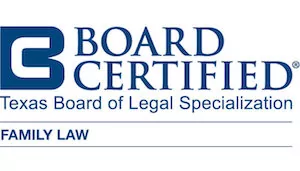In 2015, the US Supreme Court issued Obergefell v. Hodges, legalizing same-sex marriage nationwide. With the right to get married came the right to divorce. Divorce can be very stressful, and mixing in complicated legal issues makes divorce even more challenging.
If you need an LGBT divorce attorney, the Ramos Law Group can help. Led by board-certified family law specialist Mary E. Ramos, we commit ourselves to keeping up with legal developments in family law. We watch LGBT family law carefully to ensure we can represent our clients with the best tools and strategies available.
Property Division
Texas is a community property state, meaning property and debt spouses obtain during marriage are shared equally. When you divorce, you split your property in a way that is “just and right.” To divide property in this manner, you have to take into account each spouse’s circumstances and what is best for any children the couple has.
Separate Property
Property obtained before marriage typically belongs to one spouse, including investments and any earnings from them. Property a spouse receives during the marriage through inheritance, non-compensatory damages for personal injury, or as a gift also qualifies as separate property.
Special Considerations
Many same-sex couples lived together in long-term partnerships before Obergefell legalized same-sex marriage. When should property brought into the relationship be treated as community property?
One spouse legally transitioning their gender during the marriage can also raise unique issues. For example, what happens when one spouse changes their name or gender markers on their legal identification documents, but their previous name is still listed on property transfer records?
Child Custody and Visitation
By law, a court must ensure child custody and visitation arrangements reflect the best interests of the child. There are two types of custody: legal and physical. Legal custody includes the right to make important decisions about your child’s life, while physical custody means your child primarily lives with you, the custodial parent.
Conservatorships
In Texas, we have three types of conservatorships, which involve different custody arrangements including:
- Joint Managing Conservatorships (JMCs),
- Sole Managing Conservatorships (SMCs), and
- Possessory Conservatorships.
JMCs are defined by the parents sharing legal custody of the child. In some cases, particularly when there is a history of family violence or abandonment, the court may award sole physical and legal custody and an SMC to one parent. The other parent is typically awarded a possessory conservatorship and limited visitation rights.
Special Considerations
Marriage is not the only issue same-sex couples have spent decades fighting for. Unfortunately, some fights to achieve equality continue. Although the US Supreme Court has held that same-sex parents are entitled to have both their names on a child’s birth certificate, Texas law allows adoption agencies to discriminate based on religious beliefs. That means an agency may refuse to let an LGBT individual or couple adopt.
Sometimes, to get around these issues, only one parent legally adopts a child. Or the same-sex partner of someone raising their biological child never officially adopts the child despite acting as the parent. These considerations can complicate matters of child custody when LGBT individuals divorce since only the child’s legal parents are entitled to custody.
Child Support
Parents are obligated to support their children until the child turns 18 or graduates from high school, whichever comes later. When one parent has physical custody and the other does not, the non-custodial parent generally pays child support.
Calculating Child Support
Texas law sets child support guidelines. A parent typically pays 20% of their income to support one child. That value increases by 5% for each additional child, up to a maximum of 40% for five or more children. Parties can agree to a number that differentiates from the child support guidelines. Even unemployed parents are expected to pay child support and the guideline will calculate child support at a minimum wage rate.
Special Considerations for LGBT Couples
Many of the same considerations that complicate child custody also complicate child support. When only one spouse is the child’s legal parent, the other may legally owe no child support. Even if they want to pay, not being the child’s legal parent can make the situation legally complex.
Spousal Maintenance
Spousal maintenance involves regular payments one spouse must pay the other post-divorce. Spousal support involves voluntary amounts a spouse pays the other. Whether and how much a spouse pays depends heavily on the circumstances. Regardless, you generally cannot be required to pay more than whichever is less between 20% of your monthly income or $5,000.
Spousal Maintenance Obligations
You may request spousal maintenance if your marriage lasted at least ten years, you cannot provide for your reasonable needs, and you:
- Are disabled,
- Are the primary caretaker for a disabled child, or
- Lack earning capacity to meet your needs.
You can also request spousal maintenance if your partner has been convicted of family violence against you or your children in the last two years.
The maximum length spousal maintenance payments can last depends on the length of the marriage:
- 10 years for a couple married for 30 years or more,
- 7 years for a couple married between 10 and 20 years, and
- 5 years for a couple married between 5 and 10 years.
You may also be awarded spousal maintenance for up to five years based on a family violence conviction.
Special Considerations
Obergefell is not yet ten years old, so spousal maintenance is in legally murky waters for same-sex spouses. If your partner does not agree to spousal support but you need it, a lawyer can help you make a plan.
Protective Orders
Family violence is unfortunately common in our society, and LGBT couples are no exception. You can seek a temporary or long-term protective order when you separate from a spouse who abused you or another household member. The order will prohibit your spouse from contacting you.
Getting a Protective Order
You can generally get a 20-day temporary order without having to confront your abuser in court. Making the order permanent requires either your partner’s consent or you to prove your partner has abused you in court. If you need a protective order, your lawyer can provide support, guidance, compassion, and understanding to help you through the process.
Special Considerations
Rates of intimate partner violence are generally similar for same-sex and opposite-sex couples. However, transgender individuals often experience higher rates of violence. Unfortunately, LGBT or gender-nonconforming children are often at higher risk of violence in the home as well. Additionally, the lack of legal protections for LGBT individuals and the legality of religious discrimination can complicate working through the system to get the order.
Hiring a League City LGBT Divorce Lawyer
If you are an LGBT individual who needs a divorce, reach out to the Ramos Law Group today. Whether you need a gay divorce attorney or someone with experience helping trans individuals through divorce, we can help. Our commitment to legal education means we can offer unique, tailored case strategies alongside our compassionate support to help you get through your divorce.










